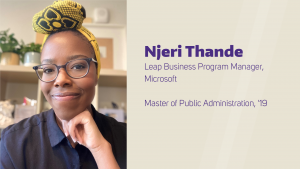January 24, 2022
Diversity and Talent in Tech: A Q&A with Njeri Thande (MPA ’19)
Njeri Thande (MPA ’19) believes in asking the right questions, approaching problems with precision, and engaging in generative work, especially when working for people’s success and wellbeing. As Leap Business Program Manager at Microsoft, Njeri focuses on increasing non-traditional talent pathways and employment opportunities in tech.
What contributed to your decision to pursue a career in support of the public good? Was there a defining moment in particular?
I think I’ve always been interested in work related to the public good. However, I started my professional career in the private sector after college right after the 2008 financial crisis. At that time, I was more concerned with being gainfully employed, so I didn’t feel like I was in a solid position to scrutinize an organization’s mission. I think I began feeling motivated towards a public good-focused career when, while working at a tech company, I was also volunteering and taking on side projects related to community building and conversations on racial identity. I was feeling pulled to the latter work and, long story short, decided it was time to go back to school. I soon after applied to Evans MPA program.
Can you share a bit about the work you are currently doing and what a typical day in your work looks like?
I work for Microsoft Leap Apprenticeship Program as a Business Program Manager. The program was founded 5 years ago as a means of diversifying the talent pipeline into tech with what we call “unconventional talent.” Unconventional talent comprises self-taught learners and bootcamp grads, parents and caregivers returning to the workforce, and community college graduates. Individuals apply for the program and successful applicants are welcomed into a cohort for a 16-week apprenticeship.
Part of my typical day involves co-leading the operations of a cohort—that work looks different every day since our program operates in phases. My work includes training sponsoring teams to understand their roles and responsibilities, working with our learning and development team to develop a best-in-class virtual classroom experience, coaching our mentors and managers through the various program milestones, and providing support for our apprentices. We work with hundreds of stakeholders to run our program. The other part of my typical day is co-leading initiatives related to scaling and continuous improvement.
In what ways are Diversity, Equity, and Inclusion part of the work you have done and continue doing?
Before Evans, I had the pleasure of co-hosting community conversations on the intersections of race and parts of community life (race and sports; race and the workplace), which was something I really enjoyed. While a student at Evans I joined the Committee for Equity and Inclusion, where I had the pleasure of doing research on belonging with Professor Jurcevic, and supported peers organizing around inclusion and belonging. Later, I had the pleasure of leading a small conference called The Good Trouble Conference, which was a way of convening peers doing work across diversity, equity, and inclusion to share what they were up to and find like-minded community. The phrase “diversity, equity, and inclusion” can be challenging because so many of us hold different worldviews, are interested in different outcomes, and don’t always have a shared theory of change. The work in convening the “Good Trouble” space was valuable to see the range of people’s work and how they were thinking through and engaging in deep issues and concepts like liberation, institutional change, and worldbuilding.
If there was one thing you’d want everyone to know about your work, what would it be?
The program I work for was founded to diversify tech and capture a talent pool that has often been ignored. I have a lot of respect for our program. And I think it’s important to name that our impact is specifically centered on employment–and that is no small thing. While we create pathways to employment opportunities and train our company to understand the unconventional talent we’re developing and onboarding, we still need the support of other company entities to fulfill the mission of building equitable practices in other areas of the work experience. It’s important to think holistically about DEI in the workplace.
Looking back on your Evans School experience, what stands out as being particularly impactful while you were a student
The Good Trouble Conference was deeply important for me. There are so many interesting, creative, and impactful things that Evans students are doing and it was a pleasure to be able to collect a small snapshot of that work. This field can feel tough as we weather so many crises in our nation and world, but it was such an amazing reminder that good, generative work (even if challenging and uncomfortable) is also being done in our world—and by our peers, no less.
I think being in generative spaces like those also help me continue the practice of unlearning and revising so that as I learn, I can continue to show up with better tools and resources to approach issues of social change.
How does your Evans education inform how you approach your work today?
My Evans education has provided me with a lot of – particularly management and leadership skills. I’m better at asking the right questions and precise in approaching problems that have to do with the wellbeing and success of groups of people. No matter where I work, that’s my focus.
Is there a resource you can share that inspires you?
Podcast: “Two Acclaimed Writers on the Art of Revising Your Life”, The Ezra Klein Show. I think Dr. Tressie McMillan Cottom and Kiese Laymon are great on every podcast they join. What is so excellent about this podcast episode is that they are in conversation together and they talk about the brave and necessary work of being critically self-reflexive and maintaining a practice of revising the way that you think and show up in your communities and your work.
